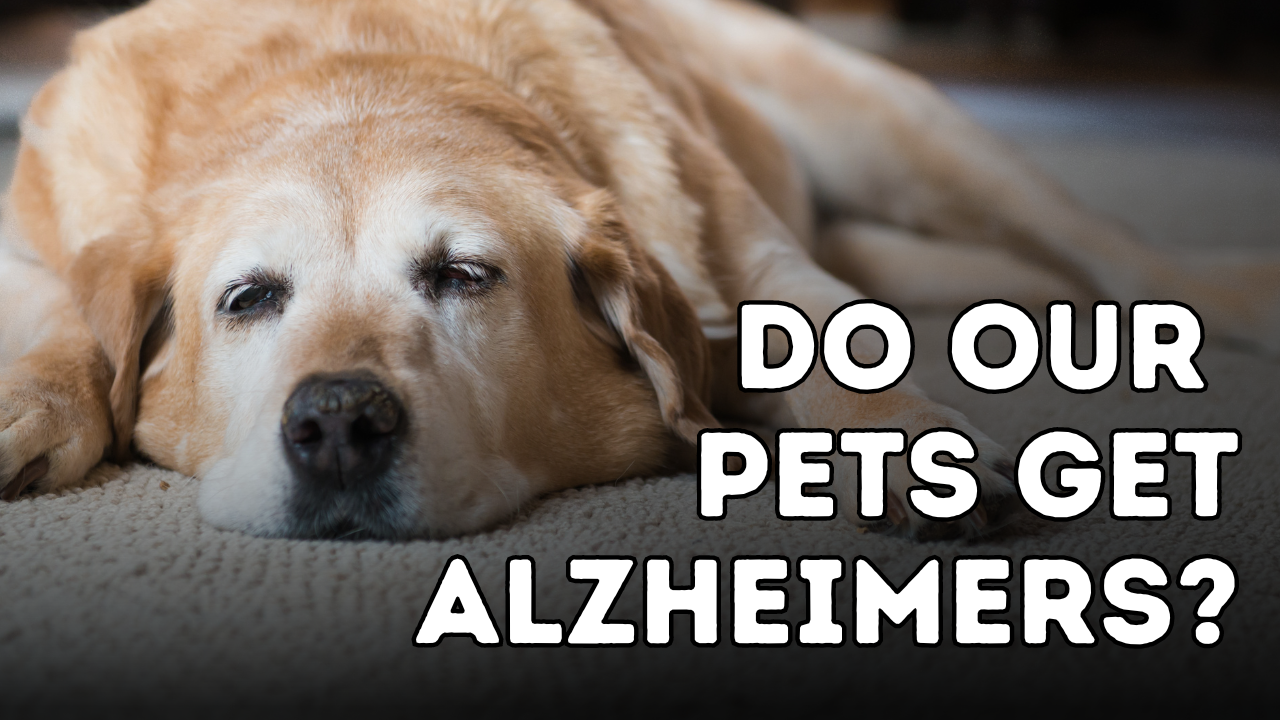Do our pets get Alzheimers?

Yes… our dogs and cats do get Alzheimer like conditions. In veterinary medicine we call it ‘cognitive dysfunction’. The brain is an organ that ages, and when the cells of the brain are affected, the brain doesn’t work as well.
Problems thinking and remembering?
It happens to all of us to some degree, BUT there are supplements that have been shown to help delay cognitive decline.
Natural antioxidants like omega-3 fatty acids, and astaxanthin can help protect the brain.
Our supplement, Dr Jones’ ULTIMATE Omega 3 Formula for Dogs and Cats is a 100% natural Krill oil, rich in the anti-inflammatory omega 3’s (EPA and DHA), as well as having the extremely beneficial antioxidant, Astaxanthin.
My dog Tula is 11, and I (Dr J) are getting older, so we are both taking them daily. 🙂
This could be an example of an aging adult and dog in stages of Cognitive Decline 🙁


As a dedicated veterinarian, I’ve seen many cases of cognitive dysfunction in pets, which is quite similar to Alzheimer’s in people. As dogs and cats age, they accumulate beta-amyloid deposits—protein plaques in their brains. This leads to behaviors and symptoms that closely resemble those seen in humans suffering from Alzheimer’s.
Recognizing the Signs of Cognitive Dysfunction
The signs of cognitive dysfunction can vary but often include:
- Increased sleep and reduced playfulness.
- A graying muzzle accompanied by diminished hearing and vision, possibly including cataracts.
- Pacing, excessive panting, and barking at inanimate objects like walls.
- Confusion and disorientation.
- Loss of previously learned behaviors, such as house training.
- Failing to recognize familiar faces.
- A noticeable disinterest in surroundings or events.
- Changes in appetite and water consumption.
- Deafness and an overall decrease in activity, making the pet appear “old."
What Causes Cognitive Dysfunction?
Pets are generally considered senior when dogs pass the age of seven and cats reach ten. With age, natural changes occur in their bodies:
- Eyes may develop cataracts.
- Bones in the middle ear can fuse, reducing hearing.
- Joints may lose their soft cartilage, leading to arthritis.
- Brain aging can lead to symptoms of senility.
Certain medications and treatments can also contribute to cognitive decline:
- Barbiturates, such as Phenobarbital, commonly used for epilepsy.
- Valium and related drugs.
- Gas anesthetics and drugs used to increase heart rate during anesthesia.
- Chemotherapy drugs for cancer.
- Steroids like prednisone, a commonly prescribed veterinary drug.
Effective Strategies and Treatments for Cognitive Dysfunction
Behavior and Environment Modification
Managing cognitive dysfunction involves a multifaceted approach focusing on behavior, environment modifications, an enhanced diet, and medication. The dual goals are to slow the disease’s progression and improve the quality of life for both pets and their owners. Providing daily activities, opportunities for play, and structured social interactions are vital for physical and mental stimulation.
Regular exposure to sunlight can help regulate the sleep-wake cycle. If mobility is an issue, consider using a wagon or a stroller to ensure your pet still gets sunlight and stimulation. It’s crucial not to treat your pet as “old," recognizing their limitations but continuing to encourage regular activities like walking.
Creating a predictable environment is also essential. Pet-proofing your home similarly to how you would toddler-proof it can prevent accidents and stress. Ensuring adequate toileting opportunities is important, as older dogs may not be able to “hold it" as long as they used to. Utilizing diapers, pads, and waterproof covers can be very helpful.
Supplements and Natural Options
Antioxidants: Supplements like Taurine, Flavonoids, Coenzyme Q, and Astaxanthin help combat free radical damage in the brain. For instance, CoQ 10 at a dose of 20mg per 10 lbs daily can be beneficial.
Alpha-Lipoic Acid: This antioxidant helps convert sugar into energy and protects against free radical damage. It works in both water and fatty tissues, making it highly effective. A dose of 10mg per 10 lbs daily is recommended.
Flavonoids: These compounds have antioxidant and anti-cancer properties. A mixed bioflavonoid product containing polyphenols, especially EGCG from green tea, is advisable. The dose for a small pet is 250 mg daily.
Melatonin: Useful for pets that have difficulty sleeping at night, with a recommended dose of 1mg per 10 lbs about an hour before bedtime.
Curcumin: Found in turmeric, curcumin has shown promise in reducing chronic inflammation linked to cognitive disorders. The suggested dose is 100mg per 10 lbs daily.
MCT Oil and CBD Oil: Both have shown potential in improving cognitive functions in studies. MCT oil should be started at a low dose, gradually increasing, while CBD oil dosages can vary based on the pet’s response.
Omega-3 Fatty Acids: These are crucial for brain health, reducing inflammation, and enhancing neuronal communication. Our Natural Krill Oil, rich in EPA and DHA, is highly recommended for pets with cognitive decline due to its high absorption rate and effectiveness.

In conclusion, while cognitive dysfunction in pets is challenging, a comprehensive treatment strategy combining behavioral modifications, environmental adjustments, and dietary supplements can significantly enhance the quality of life for our furry friends.
